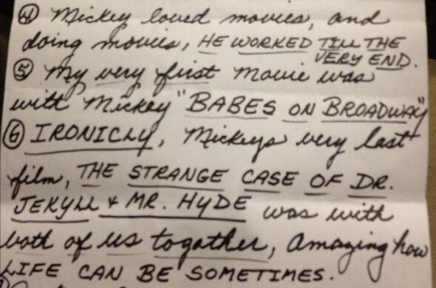 |
| Theatrical Film Poster |
Mickey Rooney's career in show business began before he could have chosen any other path in life. He was practically born performing and many of his films about up and coming stars devoted to entertaining an audience or washed up actors of a time that no longer exists forgotten by modern audiences, reflect his life. But, none of his films can fully reflect the passion he had for entertainment, or the tragic loses he suffered along the way. Mickey Rooney lived through every stage of film history. He started his career on vaudeville stages and in silent films, and even this year Mickey was working and filming movies that have not yet been released. Mickey always worked for his successes, and nothing in life was ever simply handed to him. He earned his place among the stars of MGM and Hollywood.
 |
| Mickey Rooney and Bette Davis receiving their crowns as king and queen of the movies. |
Very popular among movie buffs and Mickey Rooney fans are the series of musicals he filmed with Judy Garland in the late 30's and early 40's. It was in 1940 that Mickey Rooney was crowned the "king of the movies" by the Academy, topping actors older and with more films under their belts, such as Clark Gable, and his Boys Town co-star Spencer Tracy. Honored with him was Bette Davis, who won this title above sirens of the screen such as Joan Crawford and Norma Shearer. Following the success of previous Mickey and Judy musicals, Babes in Arms and Strike up the Band, Arthur Freed produced another film staring the two, who were taking Hollywood by storm and exciting America's youth.
 |
| Mickey Rooney and Ava Gardner were married in 1942 and remained married for only a year. |
 |
| Margaret O'Brien at 4 years old in Babes on Broadway |
Although Mickey and Judy were paired together in nine films, and always appeared together at events and award shows, it is well known that the two were never together romantically. Even during the short filming of this one movie, countless events occurred that solidified the fact that they would never be. Filming was postponed when Judy secretly flew to Las Vegas to marry her first husband, David Rose. And on set, Mickey Rooney fell for an extra, the unknown Ava Gardner, on her first job under MGM contract.
 |
| A portion of Margaret O'Briens notes for the TCMFF |
 |
| Mickey Rooney and his father, Joe Yule, in an Andy Hardy film. |
 |
| Virginia Wiedler acting alongside Mickey Rooney in Love is a Headache |
 |
| A promotional still for the film |
This movie also means a lot to me, personally. When I was 11, this filmed sparked an interest in classic movies for me, and since watching it that first time, disregarding all school work to fully engross my attention on breathtaking dance numbers and soon, finding myself tearing up at Mickey and Judy's very heartfelt romantic scenes, I have seen this film to many times to count. It remains the only film I have ever purchased on iTunes, and it has lead to my interest in all classic films, and my connections with other people in the wonderful film community. I owe it all to Mickey and Judy for putting on a show so many years ago. Although they are gone, their memory will remain for all time in the hearts of those who they inspired through film, music, and passion for entertainment.
This post is part of The getTV Mickey Rooney Blogathon hosted by Once Upon a Screen, Outspoken & Freckled and Paula’s Cinema Club taking place throughout the month of September. Please visit the getTV schedule for details on Rooney screenings throughout the month and any of the host sites for a complete list of entries.

